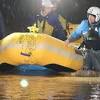Leaks in the new Northland border

Covid-19
Police and Te Tai Tokerau Border Control are working together on two temporary checkpoints to kick off the summer season from Wednesday - but how watertight will the new border be?
Auckland’s borders opening up this week has proven to be a uniquely polarising issue.
There are the Aucklanders, ready to get out and get a lungful of fresh air in what many of them consider their de facto sunny backyard - the beaches of the Coromandel and Northland.
Regional businesses reliant on the tourist dollar are predictably relieved by the inevitable Auckland exodus - although the hospitality industry in Auckland, already smarting from being largely left out of the Reactivate Tāmaki Makaurau stimulus package, have had to hope Aucklanders hit their favourite local before or after splitting the city.
But while many are breathing a sigh of relief at the idea of free passage through the Bombay Hills and Brynderwyns once more, the inevitability of further spread of Covid-19 deadens the enthusiasm of many.
Public health experts like Dr Siouxsie Wiles and Te Tai Tokerau leaders like Hone Harawira have expressed scepticism that the traffic light system will prevent case numbers from skyrocketing in relatively low vaccinated areas such as Northland and Tairāwhiti.
Although police checkpoints on roads north were announced last week, the reduction of five checkpoints down to two means slipping by may be an easy job for the unvaccinated.
The two checkpoints, placed near Maungaturoto and Uretiti cover the two State Highway routes most travellers would use - but the network of smaller roads running through the farming regions north of the Kaipara Harbour mean the checkpoints may be unable to catch all traffic passing through the area.
And with police stating they will not be stopping every car that goes by the checkpoints, Northland’s border protections may stop at a half-measure.

When the border opening was first announced, although those leaving Auckland were required to have a vaccine pass or proof of a negative test, the reality looked like it would be more of a free-for-all with police set to catch those subverting the rules with spot checks.
But following discussions with local iwi and community, police announced they will set up and manage two short-term checkpoints just north of the Northland border to temporarily replace the current border.
Instead of the five checkpoints on the regional boundary that have been manned continuously for almost four months, the two checkpoints will be located north of the boundary, on State Highway 1 at Uretiti and on State Highway 12 near Maungaturoto.
These two checkpoints will be run by police with assistance from Te Tai Tokerau Border Control and be open 24/7 on a short-term basis.
They will be operated by 74 police staff from Northland and other police districts.
Northland District Commander Superintendent Tony Hill warned the public that traffic may be heavy, although police will do what they can to keep things moving.
“Police will be stopping the vehicles, and Tai Tokerau Border Control will be assisting us to check vaccine passes and or proof of a negative Covid-19 test, to ensure as smooth and quick as possible a process through the checkpoints,” he said. “We are mindful that traffic through this region is normally busy at this time of year and motorists will know they need to plan their trip and be prepared.”
And with traffic between Tāmaki Makaurau and the winterless north rolling to a stop more and more often in recent years during the summer break, it looks like a good year for northbound travellers to expect to play the waiting game.
The border has headed north for a holiday as well, it seems, with the State Highway 1 checkpoint moving almost 50km northwards from south of Te Hana to Uretiti.
This may pose more than just an inconvenience for unvaccinated people in towns like Waipu, who may have expected to still be able to visit families or supermarkets in Whāngarei.
The two locations serve as a convenient chokepoint, marking two locations that almost all traffic must get through before parts north.
However, with only two checkpoints, the industrious and adventurous seeking to circumvent Te Tai Tokerau’s protective filter may plot a route along one of the area’s many back roads that wind through the bush in the direction of Mareretu.
This is the back way and the long way and motorists would have to know where they are going before they embark on such a trip, so most would-be shirkers will probably still travel through the checkpoint.
But this doesn’t mean they will be caught, or even stopped.
“The checkpoints will not be stopping every car and will not hold up traffic unnecessarily or impede essential travel but travellers should be prepared and expect to be stopped,” said Hill.
A similar situation occurred in early October, when boundaries were shifted south into the Waikato region after community cases were recorded in Hamilton. Due to the sheer number of roads in and out of the area, police relied on spot checks instead of instituting enforced checkpoints.
A police spokesperson said they could not comment on specific details around the checkpoints as they were operational matters, but added that their exact location had been chosen after considering many factors.
"When deciding the location of the checkpoints, police have to take into account a range of factors including logistical and health and safety considerations," they said.
Despite worries about spread of the virus into less-protected regions, Prime Minister Jacinda Ardern has remained committed to the traffic light framework and has kept to the line that it should provide more safety than the alert level system, due to its call for widespread vaccination.
When asked at the post-Cabinet press conference last week if Aucklanders should stay home this Christmas to avoid carrying the virus out with them to the regions, Ardern said people are fine to travel so long as they follow the rules.
“We are not asking people to stay home. We’re instead asking them to follow the rules wherever they are in the country,” she said. “So if you’re an Aucklander, and you’re double-vaccinated, then you’re able to move; if you haven’t been, you need to be tested. If you don’t want to do either of those things, then of course we would ask you stay where you are.”


 New Zealand
New Zealand Argentina
Argentina  Australia
Australia  Austria
Austria  Brazil
Brazil  Canada
Canada  Chile
Chile  Czechia
Czechia  France
France  Germany
Germany  Greece
Greece  Italy
Italy  Mexico
Mexico  Nigeria
Nigeria  Norway
Norway  Poland
Poland  Portugal
Portugal  Sweden
Sweden  Switzerland
Switzerland  United Kingdom
United Kingdom  United States
United States 




































